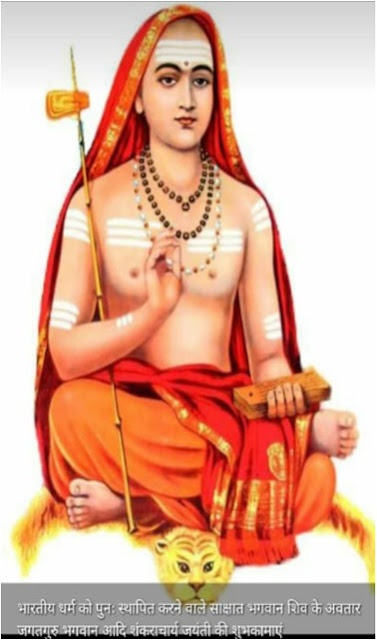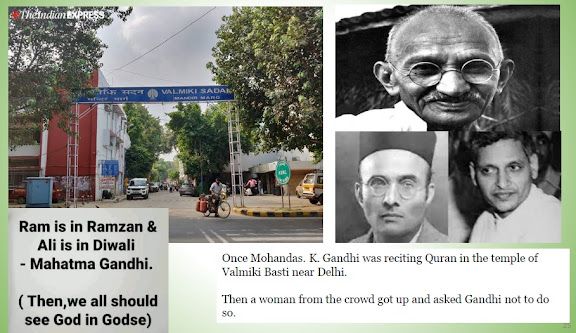1232nd Birth Anniversary of Adi Shankaracharya Shankaracharya Jayanti on Monday, April 27, 2020
Shankara was born of poor but pious Nambudiri Brahmin couple in the Kaladi village of the Kerala kingdom. He
lost his father early. He was the couple’s only child and the mother resisted
her son becoming a monk giving up all worldly life. It took great persuasion on
Shankara’s part to win her over. He promised
attending on her final hour.
He went in search of a guru for further spiritual guidance and studied under Govinda Bhagavatpada, who was a famous disciple of the great saint Gowdapadacharya.
Gowdapadacharya advocated monism or advaita. All the learning Shankara mastered was put to use through his
brilliant eloquence. Dialetics, logic and semantics were the primary areas of scholar hood
in those days, and the only means to achieve supremacy was to argue and win
debates in august assemblies of scholars. Shankara argued and won over many great scholars of his time
belonging to different faiths. He established that the original teaching of
the vedas was that God is one and the
study of vedas is the only
way to salvation.
Shankara wrote a brilliant and convincing commentary on Brahmasutras which were accepted throughout
India. He wrote commentary of Bhagavad-Gita, chief Upanishads and other
philosophic works. He is created beautiful compositions in praise of God and
Mother Goddess. Vedanta and its interpretation by Shankara is accepted and revered even by
modern theologists including Swami Vivekananda and Aurobindo.
Shankara then took missionary work traveling the entire country
(what is India today, then consisting of numerous feudal kingdoms). He
established four monasteries in the four corners of the Hindu land — Kashmir in
the North, Dwaraka in the West, Puri in the East and in Sringeri in the South.
Shankara did not forget his old mother or the promise he had made.
Tradition records that he was by his mother’s side in her final moments. He
then arranged for her funeral.
While Shankaracharya criticized Buddhism in its
decayed form, he assimilated many tenets of Buddhism cleverly, like that
of nirvana (void). It was Shankaracharya who was responsible to absorb Buddha into Hinduism and
recognize Buddha as an avatar (incarnation)
of God!
Shankaracharya was only thirty-two years old at the time of his death. Shankaracharya died in 820 CE at Kedarnath, which lies in the present day Uttarakhand.
But his life’s mission was complete.
Revival and reformation of original vedic religion, which
is considered intellectual Hinduism is alive to this day.
Sankaracharya occupies a very
important position in the history of Indian philosophy. It can be affirmed,
without any fear of contradiction, that Bharata Varsha would have ceased to
be Bharata Varsha several centuries
ago and would never have survived the murderous sword, the devastating fire and
the religious intolerance of the successive invaders, if Sankara had not lived the
life he lived and taught the lessons he taught. And those lessons are still
pulsating in every cell and in every protoplasm of the true aspirant and the
true Hindu.
Literary work of Adi Shankaracharya
Shankaracharya was a beautiful poet, with a heart filled with Love of
the Divine. He composed 72 devotional and meditative hymns such as Soundarya Lahari, Sivananda Lahari, Nirvana Shalkam, Maneesha Panchakam. He also wrote 18
commentaries on the major scriptural texts like Brahma Sutras, the Bhagavad Gita, and 12 major
Upanishads. He also wrote 23 books on the fundamentals of the Advaita Vedanta philosophy
which explain the principles of the non-dual Brahman. Some of them are Atma Bodha, Upadesa Sahasri, Viveka Chudamani, Vaakya Vrittiamong.
Some Quotes of Jagad
Guru Adi Sankaracharya:
vKnowing that I am
different from the body, I need not neglect the body. It is a vehicle that I
use to transact with the world. It is the temple which houses the Pure Self
within.
vTo be free from
bondage the wise person must practise discrimination between One-Self and the ego-self. By
that alone you will become full of joy, recognizing Self as Pure Being,
Consciousness and Bliss.






Comments